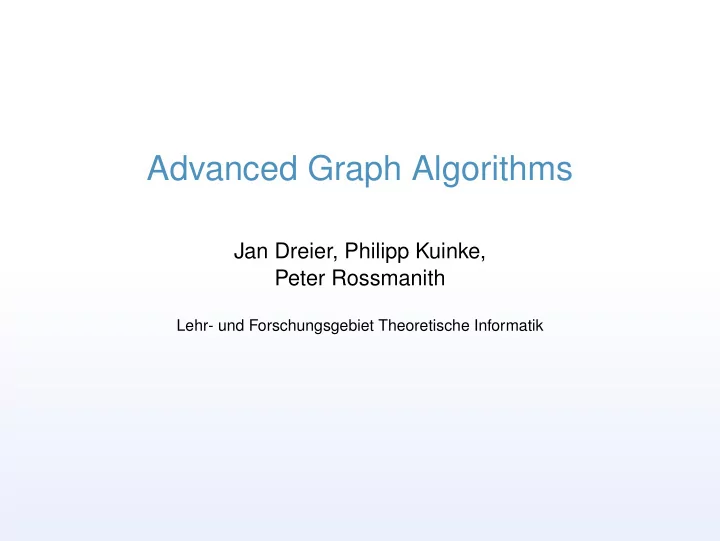

Advanced Graph Algorithms Jan Dreier, Philipp Kuinke, Peter Rossmanith Lehr- und Forschungsgebiet Theoretische Informatik
Overview Organisation Libraries Algorithms
The Topic Graph algorithms are an important tool to solve problems and Graph Libraries provide a framework for them. Open source gave rise to a lot of tools and it is time to give something back.
The Topic The goals of this practical course are as follows: • Improve on your teamwork, • improve your programming skills, • learn new and advanced graph algorithms, and • familiarize yourself with contributing to active open source projects And hopefully: Extend existing graph libraries with new algorithms.
What we expect Since this is a Masters level course we expect you already have the following • strong foundation in theoretical computer science • knowledge of basic graph algorithms (dfs, shortest-path, spanning tree, flows, etc.) • solid programming skills • familiarity with git • strong independence
Timeline • Today you will form two teams. • In three weeks you have selected a library and familiarized yourself with it. You should know exactly which algorithms are implemented and which are not (this includes checking pull requests!) • Present (and explain!) the library and the first algorithm(s) you want to implement. • In regular presentations you will tell us and the others about your progress and receive feedback.
Workflow In each team has to • understand a complicated algorithm • implement it properly • adhere to the contribution guidelines of your library • write extensive tests and debug your code • make your code as efficient as possible (profiling and optimization using callgrind, gprof, etc) • write helpful documentation • communicate with maintainer • present your progression to the other teams • submit a pull request to your library • react to changes requested by maintainer • start over with another algorithm
Meetings • Tell us and the other team • what you have done • what you are working on • what you plan to do • what the difficulties are • what your long-term goals are • Everybody needs to present • Tuesdays 14:15-15:45
Source Control We recommend using Github or Gitlab • Github: fork library directly and develop in the open • Gitlab: unlimited private repos • give us read access
Libraries The choice of the library is down to personal preference. 1 Boost (C++) 2 igraph (C) 3 JgraphT (Java) 4 Networkx (Python) 5 Something else?
Boost • Language: C++ • Website: http: //www.boost.org/doc/libs/1_66_0/libs/graph/doc/ • Content: www.boost.org/doc/libs/1_66_0/libs/graph/ doc/table_of_contents.html • Repo: https://github.com/boostorg/graph Notes: • most popular open source graph library for C++ • Mature, fast and flexible • Template based Notable Missing algorithms: • treewidth decompositions • centrality measures • planar separators • . . .
igraph • Language: C • Website: http://igraph.org/ • Manual: http://igraph.org/c/doc/ • Repo: https://github.com/igraph/igraph Notes: • Collection of network analysis tools with focus on efficiency and portability • less general and more focused than boost • Interface for python and R • maintainer seems busy • in C (memory allocation, pointers,. . . )
JgraphT • Language: Java • Website: http://jgrapht.org/ • Repo: https://github.com/jgrapht/jgrapht Notes: • Has a wiki: https://github.com/jgrapht/jgrapht/wiki • Clear contribution guidelines • Good documentation • Very object oriented (every Algorithm is a class) Notable Missing algorithms: • Planarity algorithms
Networkx • Language: Python • Website: https://networkx.github.io/ • Repo: https://github.com/networkx/networkx Notes: • Excellent documentation • Very active community • Python is slow compared to C++ and Java • Code is easily readable Notable Missing algorithms: • Exact algorithms for NP-hard problems
Something Else You can choose another graph library but it has to be well-maintained and in use! Talk to us if you want to do that.
Algorithms (some ideas)
Simple FO Model-Checking • given graph G and FO-formula ϕ , decide whether G | = ϕ • in time n | ϕ | via branching • possible to add some straightforward pruning rules • an easier project to get started
Simple Heuristics for Treewidth Decomposition • computing an optimal treewidth decomposition is hard, but a greedy strategy often leads to good results. • for algorithms see slide Possible Heuristics on Upper Bounds http://web.eecs.utk.edu/~cphillip/cs594_ spring2015_projects/treewidth.pdf • an easier project to get started
Centrality Measures • there are various centrality measures. They all try to identify the most important vertices within a graph. • boost only has edge betweenness centrality • but there are many more https://en.wikipedia.org/wiki/Centrality
Two Vertex-Disjoint Paths • A linear-time algorithm that does not need a planar embedding is presented for the problem of computing two vertex-disjoint paths, each with prescribed endpoints, in an undirected 3-connected planar graph. • paper: Hagerup, A Very Practical Algorithm for the Two-Paths Problem in 3-Connected Planar Graphs https://link.springer.com/chapter/10.1007/ 978-3-540-74839-7_14 (Behind Springer wall. Ask us if you cannot access it)
Faster Maximum Flow Algorithms • many libraries implement Edmonds-Karp, which runs in time O ( V E 2 ) . • By making a case distinction O ( V E ) is possible, see: https://en.wikipedia.org/wiki/Maximum_flow_ problem#Solutions
Weighted Flow Algorithms • many libraries have flow algorithms, but few have algorithms for weighted flow problems, e.g., min cost max flow. • some are listed at https://en.wikipedia.org/wiki/ Circulation_problem#Related_problems • these problems can often be solved easily using LPs. Can we achieve competitive performance with a more lightweight approach?
Planarity • Planarity testing • Planar embedding • Planar Separator • Planar graph generator
FPT • Consider algorithms which run in time f ( k ) n O (1) for some parameter k • Example: Find vertex cover of size k in time 2 k n • many algorithms only feasible for very small k • More fine-grained than P and NP • missing in almost every library • We have many resouces for you if you are interested in this topic (e.g., Parameterized Algorithms by Cygan et al.)
Random Graphs and Complex Networks • Community Graph Generators with ground truth (e.g. LFR benchmark) • Kleinberg-, Chung-Lu-, Configuration-Model
Recommend
More recommend